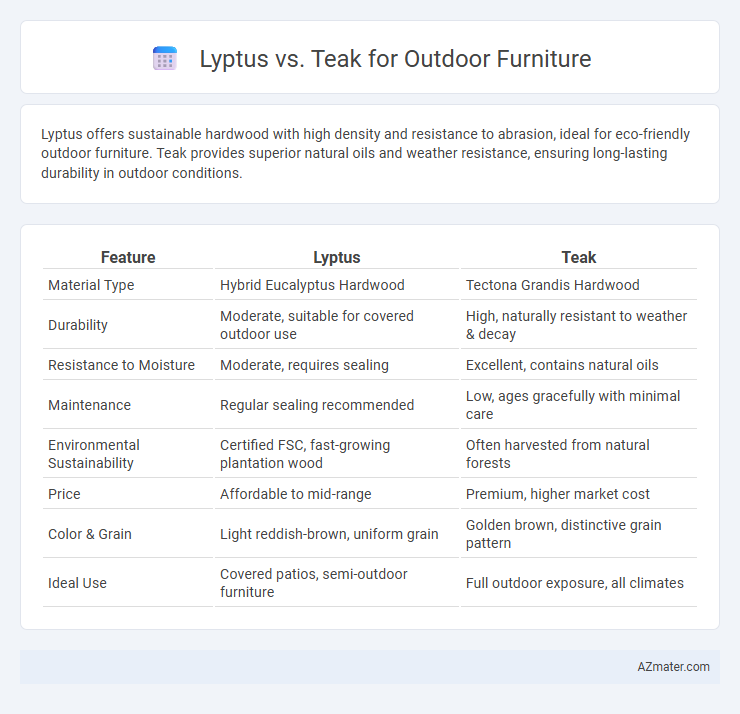Lyptus offers sustainable hardwood with high density and resistance to abrasion, ideal for eco-friendly outdoor furniture. Teak provides superior natural oils and weather resistance, ensuring long-lasting durability in outdoor conditions.
Table of Comparison
| Feature | Lyptus | Teak |
|---|---|---|
| Material Type | Hybrid Eucalyptus Hardwood | Tectona Grandis Hardwood |
| Durability | Moderate, suitable for covered outdoor use | High, naturally resistant to weather & decay |
| Resistance to Moisture | Moderate, requires sealing | Excellent, contains natural oils |
| Maintenance | Regular sealing recommended | Low, ages gracefully with minimal care |
| Environmental Sustainability | Certified FSC, fast-growing plantation wood | Often harvested from natural forests |
| Price | Affordable to mid-range | Premium, higher market cost |
| Color & Grain | Light reddish-brown, uniform grain | Golden brown, distinctive grain pattern |
| Ideal Use | Covered patios, semi-outdoor furniture | Full outdoor exposure, all climates |
Introduction to Lyptus and Teak Wood
Lyptus wood, derived from fast-growing Eucalyptus trees, offers a sustainable and eco-friendly alternative for outdoor furniture due to its natural resistance to decay and insects. Teak wood, renowned for its high oil content and dense grain, delivers exceptional durability and weather resistance, making it a premium choice for outdoor furniture. Both woods excel in longevity and maintenance, with Lyptus providing affordability and environmental benefits, while Teak ensures unmatched strength and natural beauty.
Sustainability and Environmental Impact
Lyptus is a fast-growing hybrid eucalyptus known for its sustainable harvesting practices, making it an eco-friendly choice for outdoor furniture due to its rapid replenishment and minimal deforestation impact. Teak, although naturally durable and resistant to weather, often involves ethically questionable sourcing and longer growth cycles, leading to deforestation and habitat loss concerns. Choosing Lyptus reduces carbon footprints and supports responsible forestry, while teak's environmental impact largely depends on certification and sustainable plantation management.
Durability in Outdoor Conditions
Lyptus wood offers exceptional durability for outdoor furniture due to its high density and resistance to rot and insect damage, making it a sustainable and long-lasting option. Teak is renowned for its superior natural oils and dense grain, which provide excellent weather resistance, preventing warping and cracking in various outdoor conditions. Both woods withstand moisture and sun exposure well, but teak's natural oils give it a slight edge in long-term durability without requiring extensive maintenance.
Weather Resistance and Maintenance Requirements
Lyptus offers moderate weather resistance with good durability against moisture and insects, requiring periodic sealing and cleaning to maintain its appearance outdoors. Teak stands out for exceptional weather resistance due to its high natural oil content, which protects it from rot, decay, and pests with minimal maintenance beyond occasional oil application. Both woods benefit from regular upkeep, but teak's resilience typically results in lower maintenance requirements and longer-lasting outdoor furniture performance.
Appearance: Color, Grain, and Aging
Lyptus wood features a consistent reddish-brown color with a fine, uniform grain that darkens slightly over time, maintaining a smooth and sleek appearance ideal for modern outdoor furniture. Teak exhibits a rich golden-brown hue with a distinctive oily texture and pronounced grain patterns that gracefully patina to a silvery-gray shade when exposed to the elements, enhancing its natural beauty. The aging process of teak develops a protective surface, while Lyptus requires sealing to preserve its color and grain integrity in outdoor conditions.
Workability and Ease of Construction
Lyptus offers excellent workability due to its consistent grain and smooth texture, allowing for easy cutting, sanding, and finishing in outdoor furniture construction. Teak, known for its natural oils and dense fibers, can be more challenging to work with but provides superior resistance to decay and weathering. Both woods are durable choices, but Lyptus is generally preferred by craftsmen seeking efficient machining and ease of assembly.
Cost Comparison and Value for Money
Lyptus offers a more budget-friendly option for outdoor furniture compared to teak, with prices typically 30-50% lower due to its fast growth and sustainable harvesting. Teak, prized for its exceptional durability and natural resistance to weather, commands a higher initial investment but provides unmatched longevity and minimal maintenance cost over time. Considering cost versus value, Lyptus suits cost-conscious buyers seeking eco-friendly alternatives, while teak delivers superior long-term value for those prioritizing premium quality and endurance.
Availability and Sourcing
Lyptus wood is more sustainably sourced, primarily grown in managed plantations across Brazil, leading to consistent availability for outdoor furniture production. Teak, on the other hand, has limited availability due to overharvesting and stricter export regulations, often sourced from Southeast Asia's diminishing natural forests. Choosing Lyptus supports renewable forestry practices, while teak's rarity and protected status can drive higher costs and sourcing challenges.
Suitability for Different Outdoor Furniture Styles
Lyptus, a hybrid hardwood derived from eucalyptus trees, offers a smooth texture and light color that suits contemporary and minimalist outdoor furniture styles, providing durability and resistance to decay. Teak, renowned for its natural oils and rich golden hue, excels in classic and traditional outdoor pieces, offering exceptional weather resistance and a luxurious finish. While Lyptus is ideal for sleek, modern designs requiring a sustainable alternative, teak remains unmatched for timeless, high-end outdoor furniture that ages gracefully.
Final Verdict: Choosing Between Lyptus and Teak
Teak offers superior natural oils and durability, making it highly resistant to weather, pests, and rot, ideal for long-lasting outdoor furniture with minimal maintenance. Lyptus, a hybrid eucalyptus known for its fast growth and sustainability, provides a cost-effective, moderately durable alternative but requires more care to maintain its appearance and integrity outdoors. Choosing between Lyptus and Teak depends on prioritizing eco-friendliness and budget with Lyptus versus premium durability and weather resistance with Teak.

Infographic: Lyptus vs Teak for Outdoor Furniture
 azmater.com
azmater.com